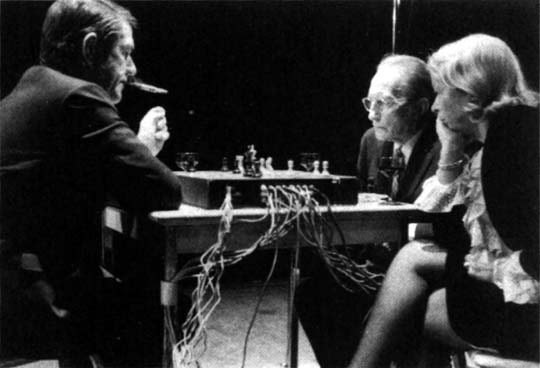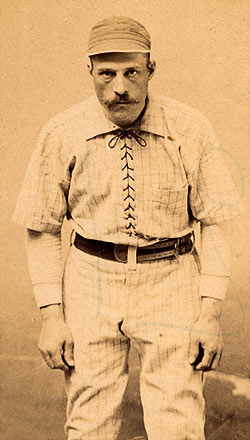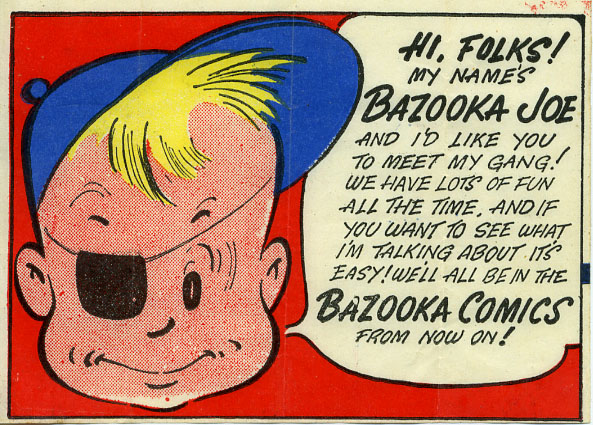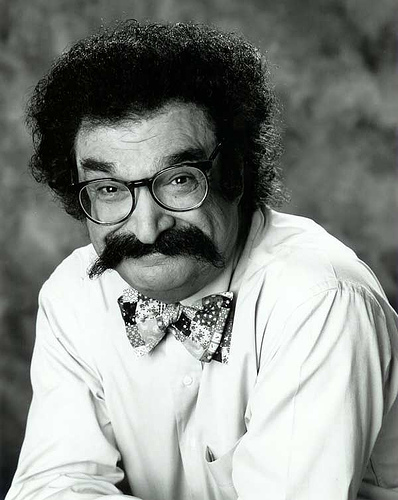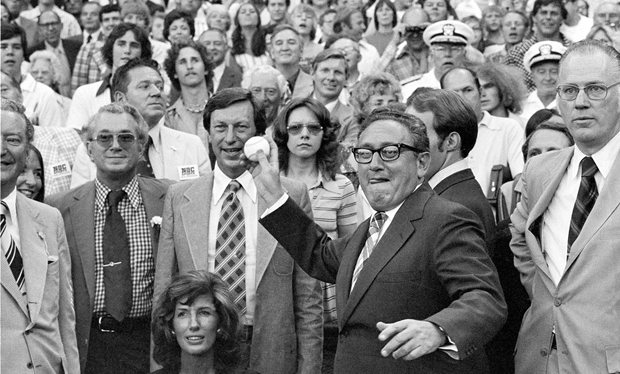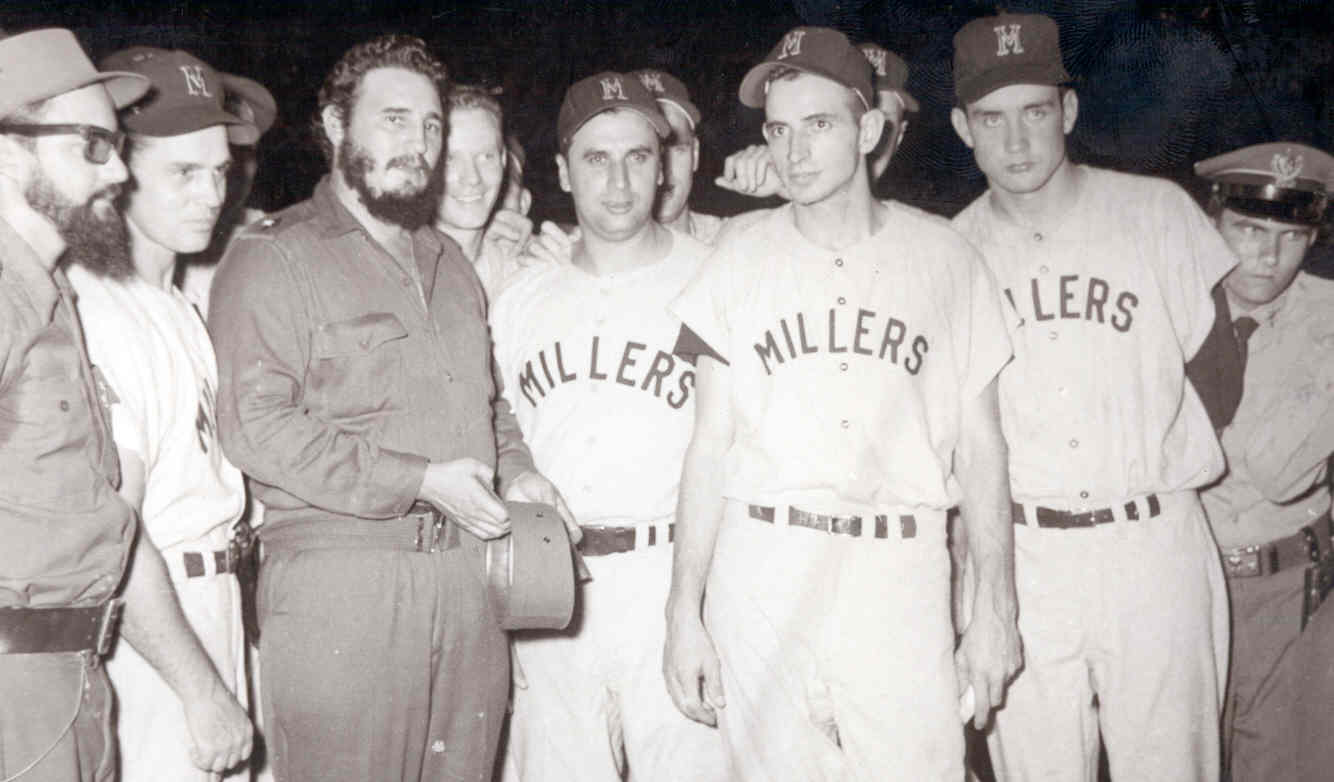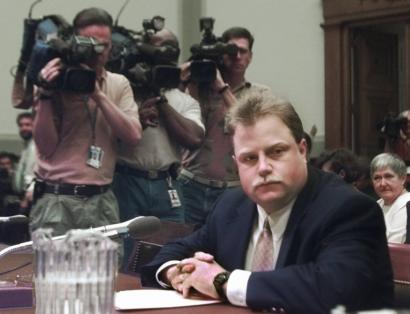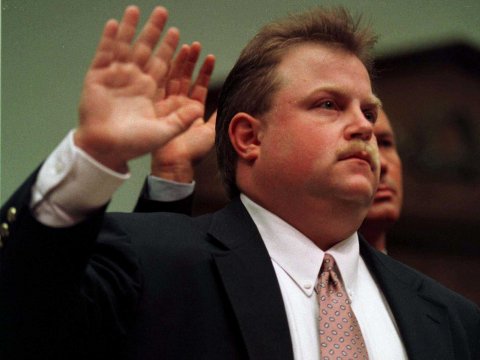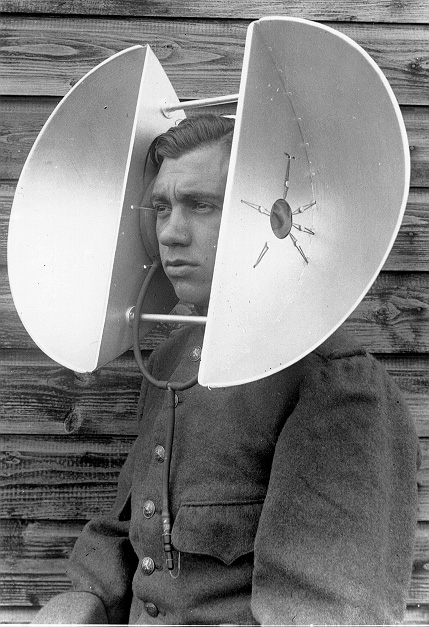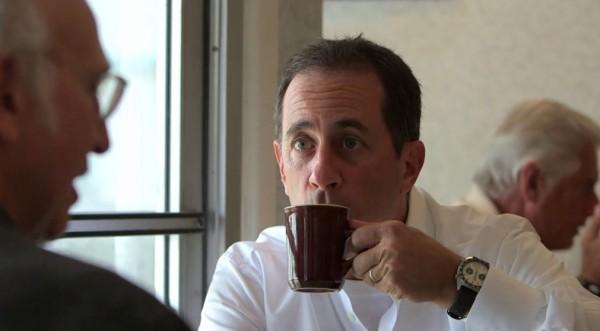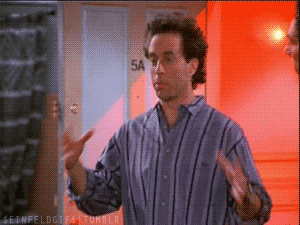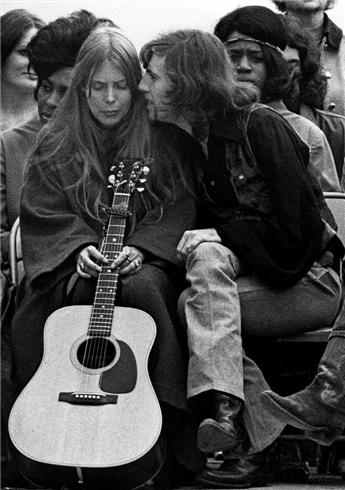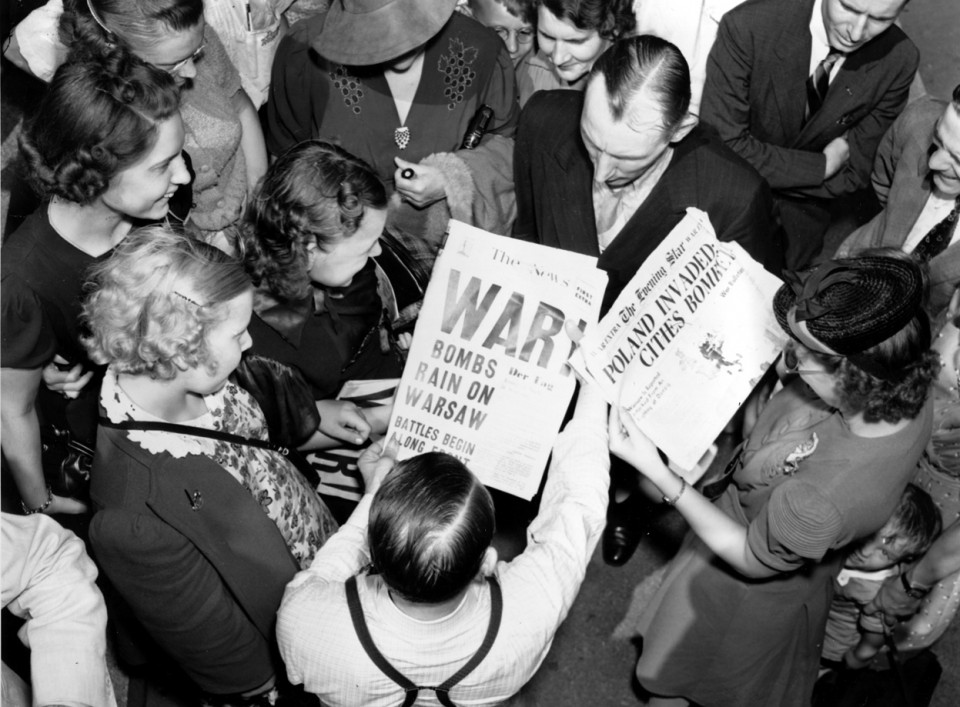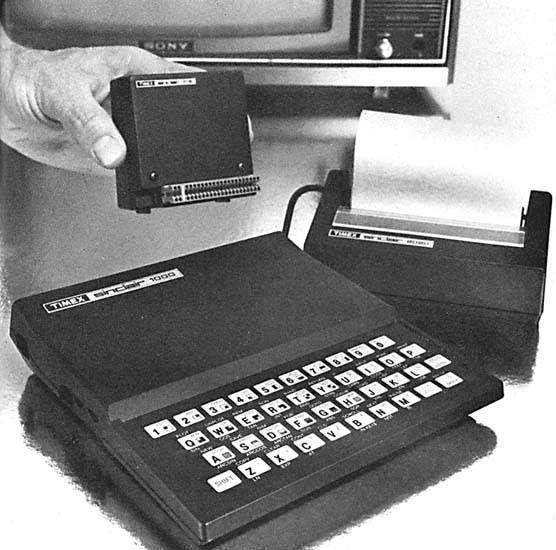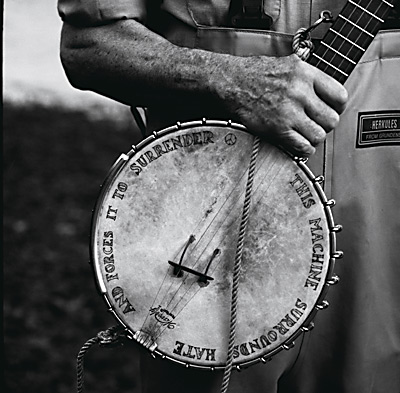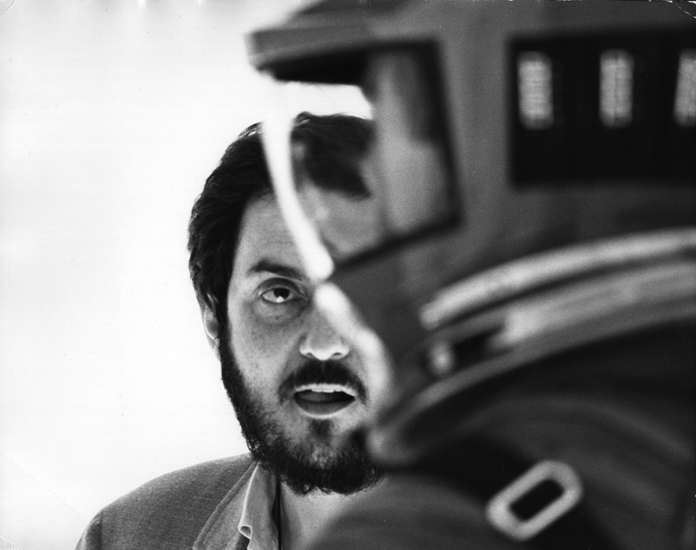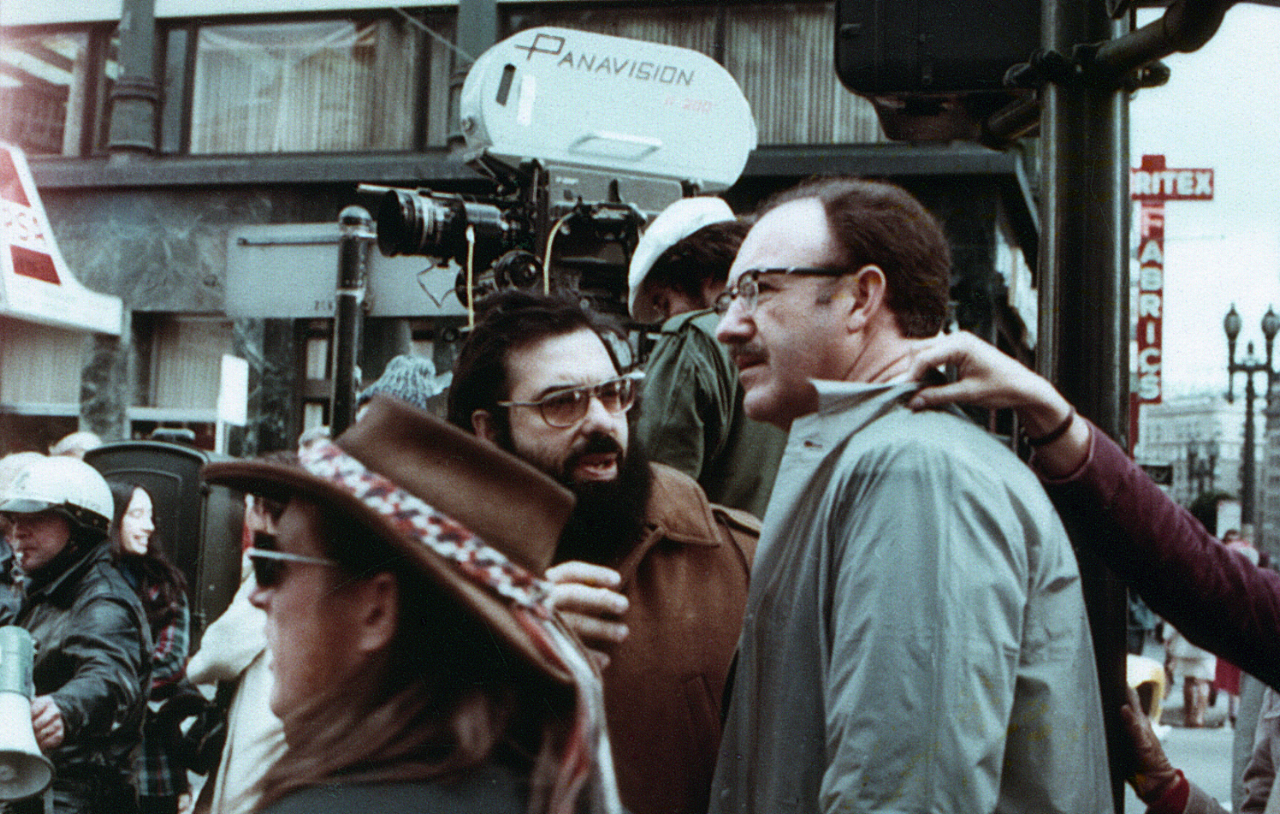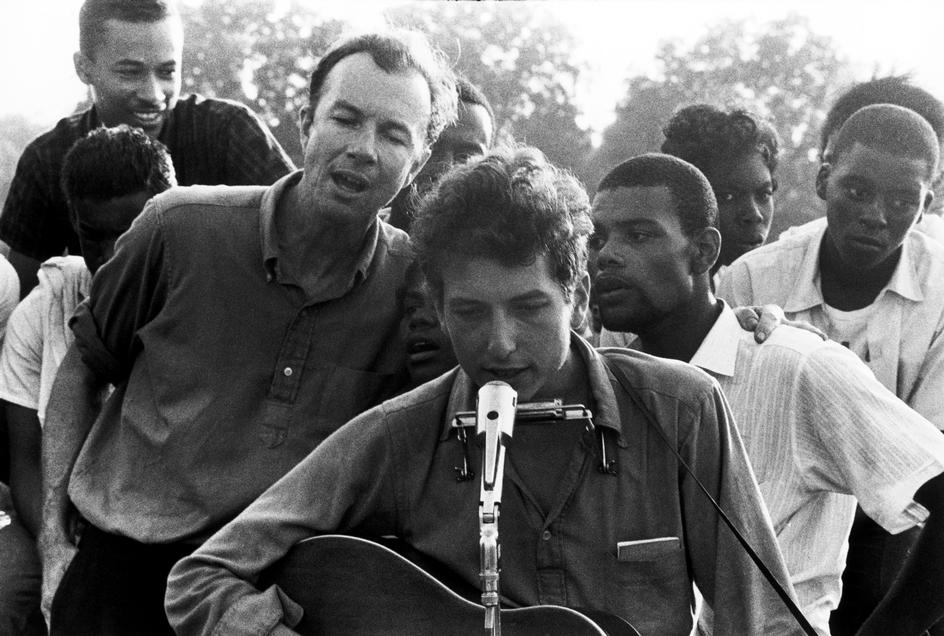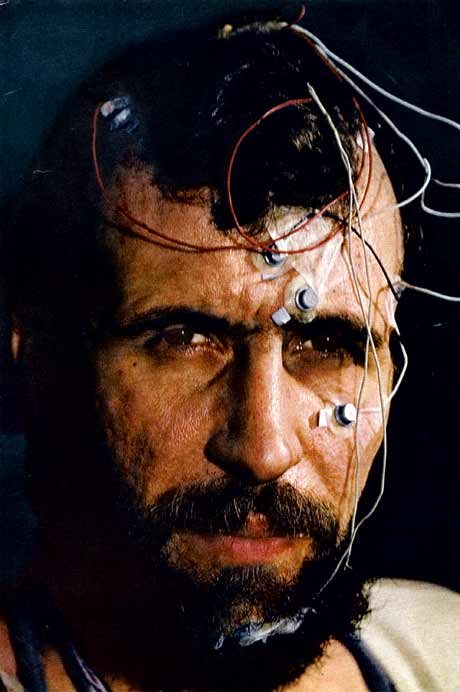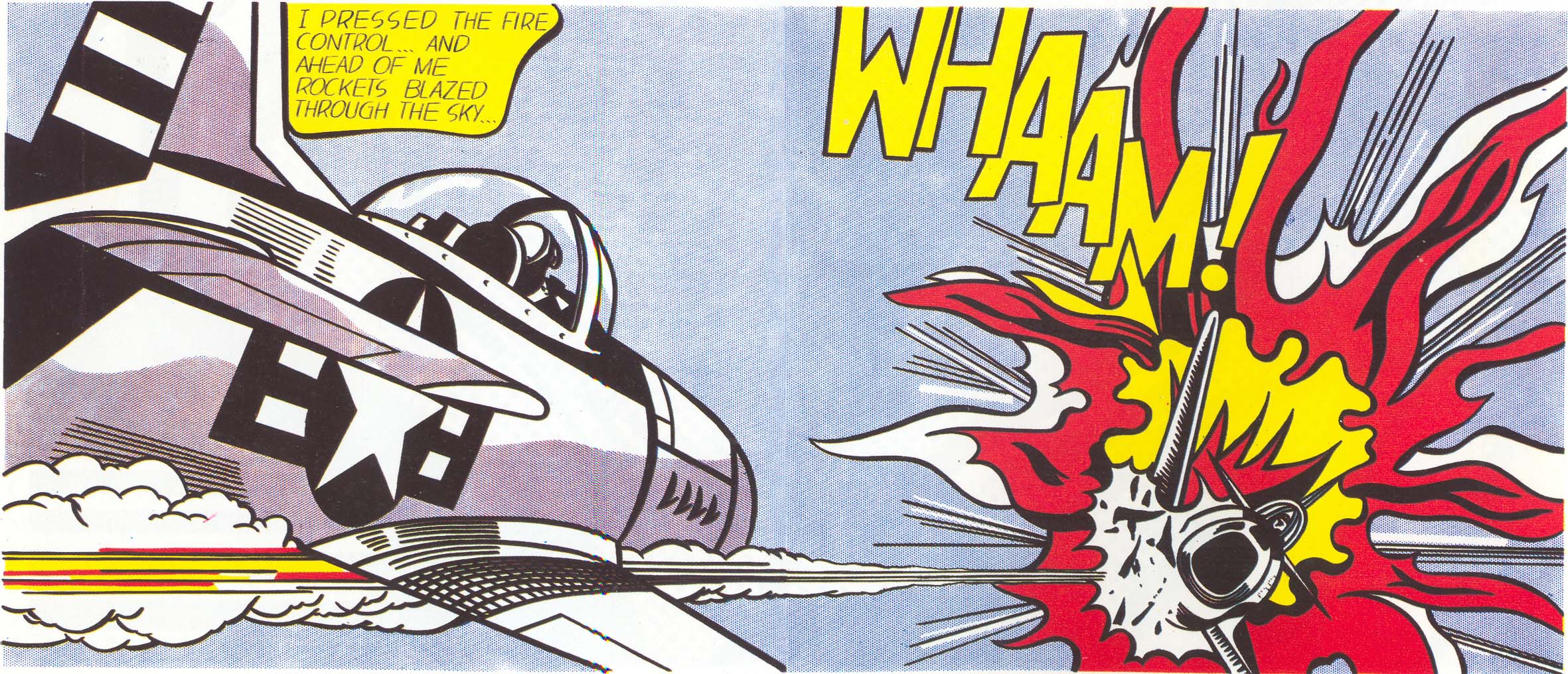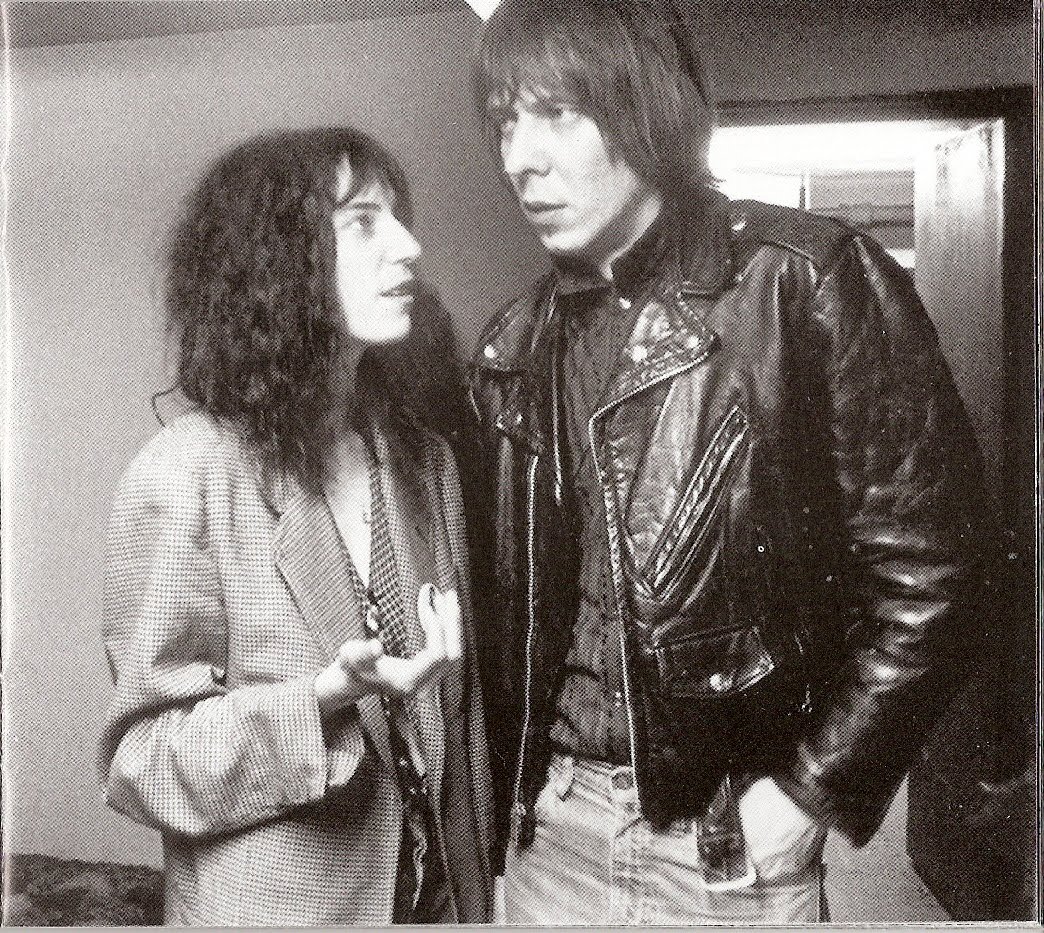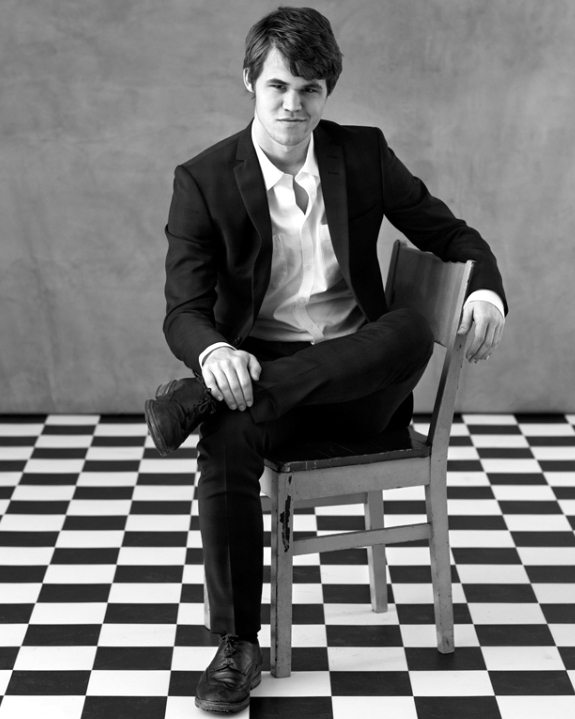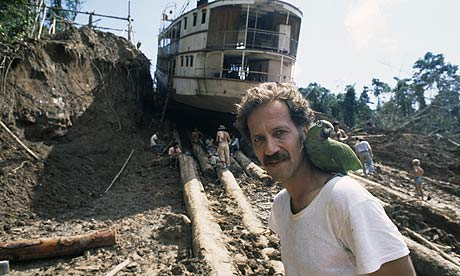In 1968, Marcel Duchamp, urinal repurposer and chess enthusiast, was interviewed by the BBC.
You are currently browsing the archive for the Videos category.
Tags: Marcel Duchamp
Paul Ryan’s excellent, impressionistic 1969 documentary, “Ski Racer,” which uses bold editing and FM radio rock to profile that era’s world-class downhill racers. One of the pros included is Vladimir “Spider” Sabich who would die horribly in 1976, the victim not of a fall but of amour fou.
From the 1974 Sports Illustrated article, “The Spider Who Finally Came In From The Cold“:
“In selling the tour, the sales pitch is not pegged strictly to exciting races and the crack skiers but also to its colorful personalities. There is Sabich, who flies, races motorcycles and figures that a night in which he hasn’t danced on at least one tabletop is a night wasted. Jim Lillstrom, Beattie’s P.R. man, also enjoys checking off some of the other characters.Norway’s Terje Overland is known as the Aquavit Kid for the boisterous postvictory celebrations he has thrown. He’s also been known to pitch over a fully laden restaurant table when the spirits have so moved him. Then there is the poet, Duncan Cullman, of Twin Mountain, N.H., author of The Selected Heavies of Duncan Duck, published at his own expense, who used to travel the tour with a gargantuan, bearded manservant. And Sepp Staffler, a popular Austrian, who plays guitar and sitar and performs nightly at different lounges in Great Gorge, N.J. when he isn’t competing. The ski tour also has its very own George Blanda. That would be blond, wispy Anderl Molterer, the 40-year-old Austrian, long a world class racer and still competitive.
Pro skiing’s immediate success, however, seems to depend on an authentic rivalry building up between Sabich and [Billy] Kidd, who are close friends but whose living styles are as diverse as snow and sand. Sabich is freewheeling on his skis as well as on tabletops. Kidd is thoughtful, earnest, a perfectionist. Spider has his flying, his motorcycles and drives a Porsche 911-E. Billy paints and now drives a Volvo station wagon. Spider enjoys the man-to-man challenge of the pro circuit. Billy harbors some inner doubts regarding his ability to adapt to it.”
If Bruce Jenner really has sexual-reassignment surgery as the tabloids have speculated, it would be the first reasonable thing he’s done since winning a gold medal in 1976. As Sochi opens, here’s a repost of an item about one of America’s greatest Olympians.
____________________________
Why the fuck did Bruce Jenner do it to himself? This 1976 short film profiles him becoming the greatest athlete in the world, before the divorces, the Village People, the cosmetic surgeries and the Kardashians–before he performed reverse alchemy, going from gold to plastic.
Few things fascinate me as much as the Olympics, for the actual sports, sure, but also for the politics and sociology that permeate the Games, the way countries use the event to attempt to remake themselves, the things that are said through ceremony rather than words. And, of course, of equal interest is what’s communicated despite the best efforts of countries to stifle them (e.g., Jesse Owens leaving Hitler in the dust in 1936).
From “Why Sochi?” Christian Caryl’s New York Review of Books piece, a brief explanation of why oh why such an unlikely locale would play host to the world:
“In all the comment about this month’s Sochi Olympics, there is bewilderment above all about Sochi itself: Why on earth would the Kremlin decide to host the Games in an underdeveloped place where terrorists lurk nearby—a place that a front-page New York Times story this week describes as ‘the edge of a war zone’?
The answer is not as complicated as it may seem. Vladimir Putin comes from St. Petersburg. He rules from Moscow. But it is the North Caucasus that launched him on his path to the summit of Russian power. Anyone who wants to understand the many controversies now roiling around Sochi must start with this fundamental political fact.
Russia launched its Olympic bid in 2006, a moment when Putin was basking in his hard-won status as the leader who had finally vanquished the long-running rebellion in Chechnya. Putin did not choose Sochi by chance. He believed that presiding over an Olympic miracle in the foothills of the Caucasus Mountains, not far from places that had been battlefields a few years before, would cement his triumph over historical enemies.”
_____________________________________________
Japan announces its postwar recovery at the 1964 Games:
Tags: Christian Caryl
Because I foolishly continue to live in NYC, I have Seasonal Affective Disorder. I really, really need Spring Training to start. Until then, some Joe Garagiola.
_____________________
In 1975, Joe Garagiola hosted a remarkably stupid and wonderful bubble-gum blowing competition among baseball players, which was sponsored by Bazooka, a brand of gum favored by hoboes during World War II. One entrant was Philadelphia catcher Tim McCarver, whose head was the size of a medicine ball. The moment the contest ended, the players went in search of the nastiest groupies they could find.
_____________________
I previously posted a brief documentary about Morganna the Kissing Bandit. Here’s her 1976 appearance on To Tell the Truth. Fittingly, the host was a male sports figure, Joe Garagiola. On the panel was film critic Gene Shalit, who was mediocre but possessed a mustache.
When I used to see Shalit at movie screenings, he would sometimes be listening to a Walkman during the film and talking aloud to himself. One time when I was sitting a row ahead of him, he screamed at me when I got up to leave after the movie was over. “Get out of the way,” he hollered. “I’m trying to watch the credits.” The dipshit was sort of right.
________________________
Like the first President he served, former Secretary of State Henry Kissinger became quite a baseball junkie, especially in his post-Washington career. At the 15:40 mark of this episode of The Baseball of World of Joe Garagiola, we see Kissinger, who could only seem competent when standing alongside that block of wood Bowie Kuhn, being honored at Fenway Park before the second game of the sensational 1975 World Series. During the raucous run by the raffish New York Mets in the second half of 1980s, both Nixon and Kissinger became mainstays at Shea Stadium. Nixon was known to send congratulatory personal notes to the players, including Darryl Strawberry. It was criminals rooting for criminals.
I can’t help but feel that Libertarians have a blind spot for the deep immorality embedded into their philosophy. Yet, it’s not like I disagree with everything Libertarian. For instance: I concur with George Mason economist Bryan Caplan that the U.S. embargo of Cuba has been detrimental to both countries. It should be stopped immediately. A few exchanges from Caplan’s Ask Me Anything at Reddit follow.
________________________
Question:
What would happen if we began trading with Cuba again?
Bryan Caplan:
They’d quickly get a lot richer, and we’d get some very nice vacations. In the longer run, the chance that Communism in Cuba would collapse or collapse into mere rhetoric is high.
________________________
Question:
Do you feel that the rise of China is beneficial to the interests of the United States?
Bryan Caplan:
When countries produce cheap stuff to sell us, it is good for us. And rich countries are very rarely militarily aggressive, at least once they’ve been rich for a full generation.
Question:
Is the U.S. a counterexample?
Bryan Caplan:
Not really. Most dominant powers throughout history have been far more aggressive. The U.S. today is scared to lose a few thousand soldiers. Why? Because rich people value their lives. Thankfully!
________________________
Question:
What books have influenced you and your career?
Bryan Caplan:
Atlas Shrugged, For a New Liberty, Economic Sophisms, The Armchair Economist, The Bell Curve, The Myth of Democratic Failure, The Nurture Assumption, and Modern Times. Mike Huemer’s been a massive influence on me, but mostly his articles, especially “Moral Objectivism.”
________________________
Question:
Tags: Bryan Caplan
Richard Jewell wasn’t exactly traduced like Joseph K., but who but Kafka could have written of his experience at the 1996 Olympics in Atlanta, where he was knocked sidelong by a rush to judgement? Just months after Ted Kaczynski was apprehended for the Unabomber explosions and had provided the template of an awkward and unshaven villain, the FBI brought another lone madman to justice, and it was Jewell–although it wasn’t really him at all.
Go here to watch Adam Hootnick’s new ESPN short doc, “Judging Jewell.”
From “The Ballad of Richard Jewell,” Marie Brenner’s 1997 Vanity Fair article:
“It took 10 minutes to pluck Jewell’s thick auburn hair. Then the F.B.I. agents led him into the kitchen and took his palm prints on the table. ‘That took 30 minutes, and they got ink all over the table,’ Bryant said. Then Bazar told Bryant they wanted Jewell to sit on the sofa and say into the telephone, ‘There is a bomb in Centennial Park. You have 30 minutes.’ That was the message given by the 911 caller on the night of the bombing. He was to repeat the message 12 times. Bryant saw the possibility of phony evidence and of his client’s going to jail. ‘I said, ‘I am not sure about this. Maybe you can do this, maybe you can’t, but you are not doing this today.”
All afternoon, Jewell was strangely quiet. He had a sophisticated knowledge of police work and believed, he later said, ‘they must have had some evidence if they wanted my hair.… I knew their game was intimidation. That is why they brought five agents instead of two.’ He felt “violated and humiliated,” he told me, but he was passive, even docile, through Bryant’s outburst. He thought of the bombing victims—Alice Hawthorne, the 44-year-old mother from Albany, Georgia, at the park with her stepdaughter; Melih Uzunyol, the Turkish cameraman who died of a heart attack; the more than 100 people taken to area hospitals, some of whom were his friends. ‘I kept thinking, These guys think I did this. These guys were accusing me of murder. This was the biggest case in the nation and the world. If they could pin it on me, they were going to put me in the electric chair.”
Tags: Adam Hootnick, Marie Brenner, Richard Jewell
Ray Kurzweil, always looking forward, believing that then is actually now, discusses how the computer, which used to be all the way across campus and is now in our pockets, will soon be within us, like a pacemaker.
Tags: Ray Kurzweil
I really loved the Seinfeld sitcom, so I wish Jerry Seinfeld would stop being so whiny and defensive when he’s asked about the treatment of women and minorities in comedy. He’s wrong and his agitated rationalizations make him look terrible. No one is asking for quotas or anything like it, just fairness.
The reason critics question why some shows, like the first season of Comedians in Cars Getting Coffee, are so white and male, is because high-profile comedy vehicles have been controlled by white men and favored white men for so long. Should Saturday Night Live have not been questioned for having so few African-American women in its cast when so many great ones were available across decades? Should David Letterman have not been questioned about going years with barely having a female stand-up comic during such an amazing era for female comedians? Such questions being asked have helped bring about change. Those questions should continue. If that upsets Jerry Seinfeld, so be it. Sometimes people get upset not because criticism is unjust but because it’s spot-on.
Tags: Jerry Seinfeld, Peter Lauria
Michael “Mr. Mike” O’Donoghue, the darkest and cruelest writer of the original Saturday Night Live, a Marquis de Sade for the National Lampoon set, is afforded a bizarre TV-magazine profile the morning after a Halloween party. How apt.
Tags: Michael O'Donoghue, Russ Stanton
If someone were to speak ill about Joni Mitchell or her music, I might have to decapitate that man. You see, I am a fan. Even more than Joan Baez, Mitchell seemed the true believer, the real deal, bound to be disappointed by everyone and everything around her.
At the 50-second mark of this video footage from 1969’s Big Sur Folk Festival, she sings a breathtaking version of “Get Together” with David Crosby, Stephen Stills, Graham Nash and John Sebastian performing backing vocals. It’s a song of peace and brotherhood, and it will sound beautiful to your disrespectful head as it rolls down Fifth Avenue.
Tags: David Crosby, Graham Nash, John Sebastian, Joni Mitchell, Stephen Stills
I think of the era in America between the one wallpapered with newsprint (pre-1960) and the one given to smartphone updates (today), that time when TV news was predominant, as an age of delusion. That was when Newt Gingrich’s word games could work, when a screenshot of Willie Horton could win. It was an age of bullshit and manipulation. Why, an actor playing a part could become President, aided by Hallmark Card-level writers.
You’re free to feel less than sanguine about the transition, about the financial metrics of newsgathering and the threat it poses to less-profitable but vital journalism (as I sometimes am), but I will choose the deluge of information we get now to centralized media when far fewer had far greater control of the flow. People seem to get bamboozled much less now. Let it rain, I say. Let it pour. Let us swim together in the flood.
Anyhow, we always romanticized the wrong part of the newspaper. It wasn’t great because of the print. I mean, what’s so important about a lousy, crummy newspaper?
From “The Golden Age of Journalism?” a wonderful TomDispatch essay by Tom Engelhardt about the downfall of one type of news and the thing that has supplanted it:
“In so many ways, it’s been, and continues to be, a sad, even horrific, tale of loss. (A similar tale of woe involves the printed book. It’s only advantage: there were no ads to flee the premises, but it suffered nonetheless — already largely crowded out of the newspaper as a non-revenue producer and out of consciousness by a blitz of new ways of reading and being entertained. And I say that as someone who has spent most of his life as an editor of print books.) The keening and mourning about the fall of print journalism has gone on for years. It’s a development that represents — depending on who’s telling the story — the end of an age, the fall of all standards, or the loss of civic spirit and the sort of investigative coverage that might keep a few more politicians and corporate heads honest, and so forth and so on.
Let’s admit that the sins of the Internet are legion and well-known: the massive programs of government surveillance it enables; the corporate surveillance it ensures; the loss of privacy it encourages; the flamers and trolls it births; the conspiracy theorists, angry men, and strange characters to whom it gives a seemingly endless moment in the sun; and the way, among other things, it tends to sort like and like together in a self-reinforcing loop of opinion. Yes, yes, it’s all true, all unnerving, all terrible.
As the editor of TomDispatch.com, I’ve spent the last decade-plus plunged into just that world, often with people half my age or younger. I don’t tweet. I don’t have a Kindle or the equivalent. I don’t even have a smart phone or a tablet of any sort. When something — anything — goes wrong with my computer I feel like a doomed figure in an alien universe, wish for the last machine I understood (a typewriter), and then throw myself on the mercy of my daughter.
I’ve been overwhelmed, especially at the height of the Bush years, by cookie-cutter hate email — sometimes scores or hundreds of them at a time — of a sort that would make your skin crawl. I’ve been threatened. I’ve repeatedly received “critical” (and abusive) emails, blasts of red hot anger that would startle anyone, because the Internet, so my experience tells me, loosens inhibitions, wipes out taboos, and encourages a sense of anonymity that in the older world of print, letters, or face-to-face meetings would have been far less likely to take center stage. I’ve seen plenty that’s disturbed me. So you’d think, given my age, my background, and my present life, that I, too, might be in mourning for everything that’s going, going, gone, everything we’ve lost.
But I have to admit it: I have another feeling that, at a purely personal level, outweighs all of the above. In terms of journalism, of expression, of voice, of fine reporting and superb writing, of a range of news, thoughts, views, perspectives, and opinions about places, worlds, and phenomena that I wouldn’t otherwise have known about, there has never been an experimental moment like this. I’m in awe. Despite everything, despite every malign purpose to which the Internet is being put, I consider it a wonder of our age. Yes, perhaps it is the age from hell for traditional reporters (and editors) working double-time, online and off, for newspapers that are crumbling, but for readers, can there be any doubt that now, not the 1840s or the 1930s or the 1960s, is the golden age of journalism?
Think of it as the upbeat twin of NSA surveillance.“•
Tags: Tom Engelhardt
I posted about Timex’s failed foray into wearables in the mid-1990s, and here’s a commercial for the Sinclair 1000–touted as “the first computer under $100”–during the company’s equally unsuccessful 1982 attempt to corner the PC market.
One final Pete Seeger video, this one is “To Hear Your Banjo Play,” a 1947 short written and directed by musicologist Alan Lomax. Probably the best portrait of the man and his music.
Tags: Alan Lomax, Pete Seeger
Well, this is fun. Introduced by Vernon Myers, the publisher of Look, the 1966 short film, “A Look Behind the Future,” focuses on the magazine’s former photographer Stanley Kubrick, who was in the process of making 2001: A Space Odyssey at London’s MGM studios. It’s a nice companion piece to Jeremy Bernstein’s two great New Yorker articles about the movie during its long gestation (here and here).
Mentioned or seen in this video: Mobile phones, laptop computers, Wernher Von Braun, memory helmets, a 38-ton centrifuge, Arthur C. Clarke at the Long Island warehouse where the NASA L.E.M. (Lunar Excursion Module) was being constructed, Keir Dullea meeting the press, etc.
Tags: Jeremy Bernstein, Keir Dullea, Stanley Kubrick, Vernon Myers
Here’s a wonderful featurette about Francis Ford Coppola making The Conversation, the 1974 psychological thriller, which moved the disquiet of Antonioni’s Blow-Up into the Watergate era, asked questions about a world where everyone is a spy and spied upon. The surprise 40 years later: Few seem upset about the new order of the techno-society. We haven’t been trapped after all; we’ve logged on and signed up for it. My short essay about the film follows the video.
A product of the Watergate decade, an era when spying and snooping at least gave us pause, Francis Ford Coppola’s The Conversation was made before ubiquitous public security cameras were watching us, phones were tracking us and seemingly everyone was living in public. A lack of privacy has never been as well-regarded as it is today nor have the perils of such actions, which are investigated in this film, been so invisible.
Harry Caul (Gene Hackman) is a jazz loving San Franciscan who earns his living as a surveillance expert, stealthily recording private conversations with an elaborate array of mikes of his own making. Caul is top dog in the trade, and he’s paid handsomely to find answers for his bosses and not ask them any questions. A devout Catholic, the wire tapper has moral issues with his work, especially since information he culled in a past case led to murder. But it’s hard for Caul to stop doing what he’s doing because he’s so damn good at it, something of an artist.
While he may be an artist, Caul is definitely a hypocrite. He keeps everything about himself strictly private, even from his girlfriend (Teri Garr) and point man (John Cazale). He rationalizes he’s doing it for safety reasons, but it’s also in his nature. This delicate balance is thrown off-kilter when Caul believes his latest assignment, in which a wealthy man is paying for info about his young wife, may also lead to murder. Caul can’t head down that road again and a crisis of conscience makes him go rogue. Soon he himself is the target of surveillance, a probing that he can’t withstand.
In the era that saw the downfall of an American President who listened to the tapes of others and erased his own, The Conversation was amazingly relevant, but in some ways it may be even more meaningful in this exhibitionist age, in which we gleefully hand over our privacy to satisfy our egos. As Caul and Nixon learned, and as we may yet, those who press PLAY don’t always get to choose when to press STOP.•
Tags: Francis Ford Coppola, Gene Hackman
Pete Seeger, in 2012, trading bon mots with that “right-wing gun nut” Stephen Colbert. The host is brilliant, as he always is, in using just a few words to trace the history of lefty politics from the folk movement forward.
Tags: Bob Dylan, Pete Seeger, Stephen Colbert
We’re all irreplaceable, each of us, but few more than the singer-songwriter Pete Seeger, whose death feels like the actual end of the twentieth century, so many of that era’s struggles and triumphs burned into his flesh. He was really American and completely foreign. Not a bad thing to be.
An episode of his lo-fi 1960s TV odyssey, Rainbow Quest.
From Jennie Rothenberg Gritz in the Atlantic, writing about Rainbow Quest:
“For a brief period in the mid-1960s, Seeger hosted his own program on the ‘magic screen.’ The show was called Rainbow Quest (named after a line in one of Seeger’s songs). Despite the colorful title, it was filmed in black and white, in a New Jersey studio with no audience, and broadcast over a Spanish-language UHF station. Seeger’s wife, Toshi, was listed in the credits as ‘Chief Cook and Bottle Washer.’
Even with this bare-bones production, Seeger clearly found the new medium disorienting. ‘You know, I’m like a blind man, looking out through this little magic screen,” he said at the start of the first episode, gazing awkwardly into the camera. ‘And I—I don’t know if you see me. I know I can’t see you.’ Over the next 10 minutes, he alternated between noodling gorgeously on his banjo and explaining his distrust of the ‘little box’ that sat in every American living room, killing ambition, romance, and human interaction.
But then he started talking about Huddie Ledbetter and giving his invisible audience an impromptu 12-string guitar lesson. And then the Clancy Brothers showed up in their big woolly sweaters and performed a rousing set of Irish tunes. At that point, Seeger seemed to settle into his comfort zone—a state of natural curiosity and delight.”
Having posted earlier today about speleologist and chronobiologist Michel Siffre, here’s a gorgeous, hypnotic film about his 1972 “Midnight Cave” time-isolation experiment in Del Rio, Texas. It’s TV dinners and Plato and guns and mice and being and nothingness.
Tags: Michel Siffre
When Timex introduced cheap, seemingly unbreakable watches in the 1950s, the product was given short shrift by both media and jewelers, but they soon were category leaders. The Timex Data Link of the 1990s, however, made in conjunction with Microsoft, was probably awarded too much credit. Before computers were tiny and powerful, the Data Link was the first watch that could receive downloaded information. It wasn’t good enough, but it was (sort of) the future. From a 1994 article in the New York Times:
“Talk about information at your fingertips. The Timex Corporation and the Microsoft Corporation said today that they had teamed up to develop a wristwatch that can store information received directly from a personal computer screen.
The Timex Data Link watch, which will cost about $130 when it goes on sale in September, uses a wireless optical scanning system to receive data from Microsoft software.
The Data Link watch was demonstrated today at a presentation by Microsoft’s chairman, Bill Gates, who held it up to a computer as a series of bar-code lines flashed on the screen. After several seconds, Mr. Gates was able to scroll through personal information like appointment locations and telephone numbers at the touch of a button on the watch.
Fast Sales Predicted
C. Michael Jacobi, the president of Timex, predicted that the company would sell 200,000 of the watches in the final three months of this year, making it the fastest-selling watch ever in its price category.
The new watch looks like a regular round sports watch and includes such standard digital watch functions as a calendar, light, dual time-zone settings and alarms.
Using a microchip developed by Timex with Motorola Inc., the watch can store about 70 messages in its memory, downloading them in about 20 seconds, officials said.
Each watch will include software compatible with Microsoft Windows 3.1 and the company’s scheduling applications, such as Schedule Plus. The software also will be compatible with future versions of Windows, including a ‘Chicago’ upgrade expected out by the end of the year.
Users simply need to hold the watch about a foot away from their computer screens to download data, which can be done as often as needed.
Laptops Won’t Work
However, road warriors will be disappointed to learn that the watch will not work with laptop computers, which do not have a strong enough lighting source in their screens, Timex officials said.”
____________________________
Unrelated to the Data Link but very beautiful, a 1965 commercial touting Timex’s waterproof properties:
From Simon Schama’s new Financial Times profile of Patti Smith, a quick look at her as a political animal, and one who is greatly disappointed with the “good Republican” Barack Obama:
“In 1980 she married Fred ‘Sonic’ Smith of MC5, took a more political turn and wrote with him, ‘People Have the Power.’ Politics didn’t come naturally to her, she says, but she had worked for Robert Kennedy’s senatorial campaign. When he was assassinated, she withdrew from the political world and it took the more activist Fred to quicken those combative political instincts. ‘In my usual way I consulted Blake and the Bible. ‘The meek shall inherit the earth.’ I certainly got that.’ Becoming interested in St Francis and making an informal pilgrimage to Assisi, she thought it something of a miracle when a pope came along who adopted the name and, apparently, the social evangelism that went with it. ‘They said there would never be a Jesuit pope nor a Franciscan one. Now they have both.’
Every so often the old fury of ‘Radio Baghdad‘ comes back. She remembers with quiet contempt a virtual conspiracy of media silence when a protest rally against the Iraq war, a hundred thousand strong, received barely any coverage. Though she rejoiced at the election of an African-American to the White House, like millions of others on the left she has not forgiven him for keeping Guantánamo open and prosecuting the war in Afghanistan. ‘To me he’s just like a good Republican.’ The ‘celebrity-driven, materialist’ culture saddens her, especially when she sees ‘three-year-olds being comforted by cellphones and video games instead of being told stories.’ The ongoing destruction of the environment fills her with yet more bleak sorrow. With a little sigh she returns to Blake. ‘More than ever as I get older I can feel what it takes to be him – a casualty of the industrial revolution while he sits at home hand-colouring prints of shepherds.’
But then, she says, resolutely, pushing back the gloom, ‘I am still a very optimistic person. I continue to do work with joy.’ The Beethoven strain comes through. The first opera she saw was Fidelio, a work so perfectly fitted to her temperament that she wanted to make a film of it. ‘I know the opening shots. I am Leonore/Fidelio, with waist-length hair. I pick up the scissors and cut it.'”•
__________________
Smith, in 1979, singing Debby Boone’s hit, “You Light Up My Life,” on children’s show Kids Are People Too. She’s accompanied on piano by the song’s composer, Joseph Brooks, who would commit suicide in 2011 after being charged with serial sex crimes. A little more than two years later, Brooks’ son Nicholas was convicted of murdering his girlfriend.
Tags: Patti Smith, Simon Schama
Tags: Bill Gates, Magnus Carlsen
Orwell, of course, was the main inspiration for Apple’s “1984” Super Bowl ad by Ridley Scott, but it also riffed on Fritz Lang’s Metropolis, which is perhaps more influential from a visual perspective than any other work of art ever. Sure, Lang’s plot was overheated, but, my god, those images. You can’t truly be literate about media without having seen it.
The Apple spot “went viral” thirty years ago, even though it was shown only once, and there was yet no infrastructure for it to be propelled by person to person. What careered around the world wasn’t the actual spot but verbal descriptions of it. It was the collision of a new thing (computers) and an old thing (oral history). And soon enough, the centralized media was smashed, though that didn’t make the world perfect. Tyranny doesn’t disappear; it just attempts to reinvent itself.
Steve Jobs introduces the commercial at the 1984 Apple keynote.
Tags: Fritz Lang, George Orwell, Ridley Scott., Steve Jobs
A great 1982 South Bank Show portrait of Werner Herzog broadcast as Fitzcarraldo, a film I think Eisenstein would have been proud to call his own, was nearing its screening at Cannes. When I interviewed the director a decade or so ago, he insisted to me that he was “clinically sane” but appreciated the journalists (“stooges,” he called them) who portrayed him as mad because he felt protected by the scary reputation.
Tags: Werner Herzog

